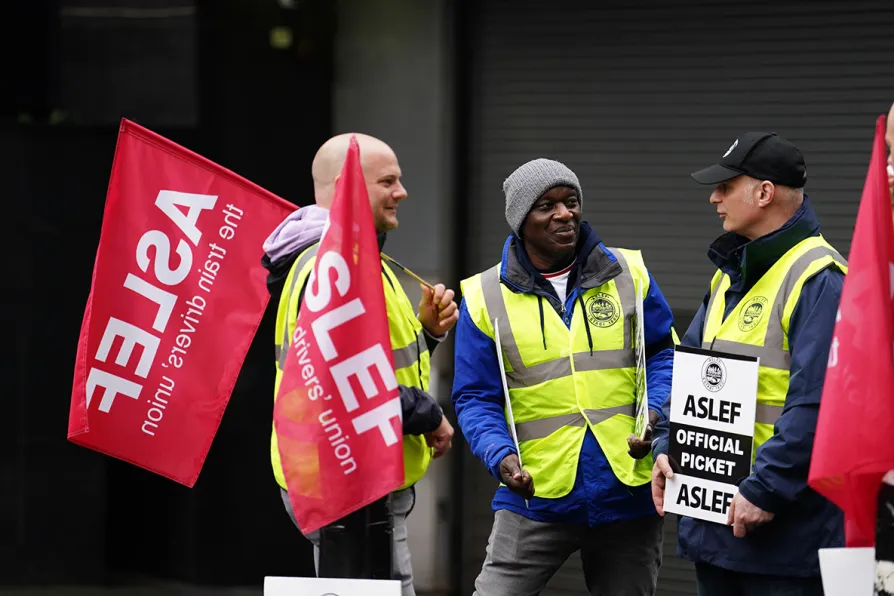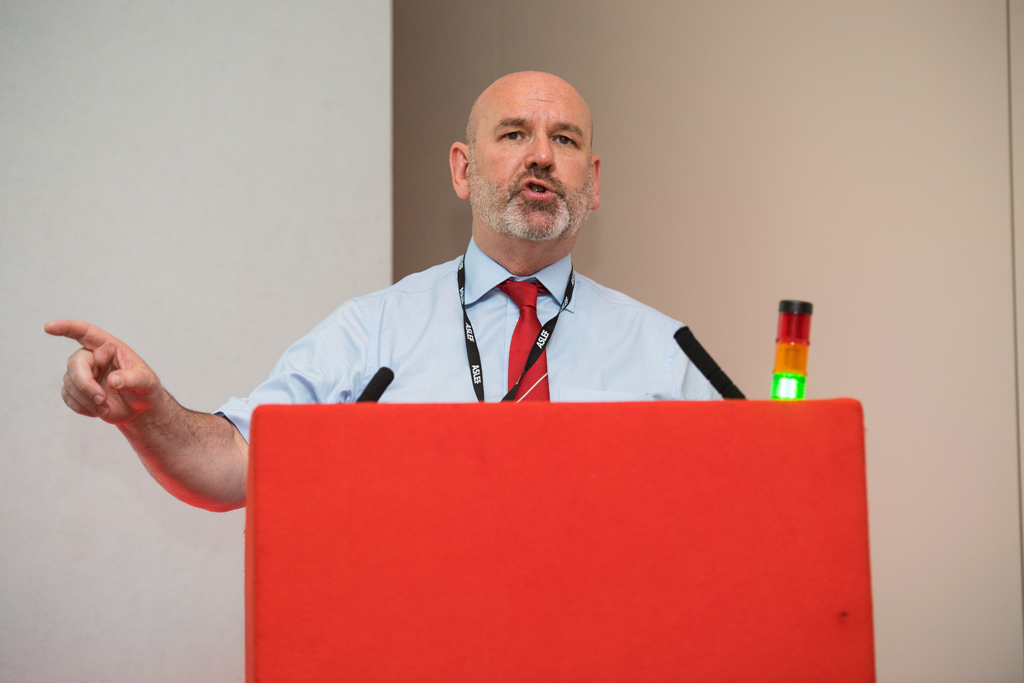As tens of thousands return to the streets for the first national Palestine march of 2026, this movement refuses to be sidelined or silenced, says PETER LEARY
On the eve of the 157th Trades Union Congress, MICK WHELAN, general secretary of Aslef, the train drivers’ union, celebrates victory in his campaign to get dignity for drivers at work

 Train drivers from the Aslef union on the picket line at Euston station in London, as they are launching a wave of fresh walkouts in a long-running dispute over pay. April 5, 2024
Train drivers from the Aslef union on the picket line at Euston station in London, as they are launching a wave of fresh walkouts in a long-running dispute over pay. April 5, 2024
I SOMETIMES think that, in the Labour Party and the labour movement, we don’t always make enough of our successes. That’s why I’m looking forward to the series of Union Wins videos in the conference hall in Brighton this week.
Because Aslef is celebrating a really significant victory in our campaign to ensure train drivers get the dignity they deserve at work.
On Tuesday July 29, after eight months of serious and significant lobbying, Richard Hines, the director of railway safety and His Majesty’s Chief Inspector of Railways, wrote to every train and freight operating company in Britain asking them to provide proper facilities for staff, as well as passengers, on the UK rail network.
This means that train drivers will — finally — have access to toilets at work and will no longer have to go more than four hours on duty before they have access to a toilet. Because the industry has — at last — signed up to Aslef’s Dignity for Drivers campaign which we launched at Westminster and Holyrood in November.
We explained to MPs and MSPs that the absence of safe, clean, and appropriate toilet facilities, and the lack of opportunities for staff to access them during their working day, is a real problem on the railway.
Train drivers who cannot access proper toilet facilities, or are not given time to do so, are forced to urinate in public areas, defecate in the open, use inappropriate containers, and even, on occasion, soil their clothes or seat.
As well as being very stressful, and rather humiliating, the related public health impact affects not only train drivers, but their colleagues, cleaning staff and passengers, who are exposed to human waste.
Hines has now told train companies in his letter: “I want to emphasise that access to clean, safe, and reliable welfare facilities is not a luxury — it is a basic requirement in any civilised society. The current situation, where some railway workers still lack adequate facilities or the time to use them, is unacceptable. This is a matter of human dignity, health, safety and respect to our people.”
And he has told the companies “to take ownership of this issue and work collaboratively to deliver tangible, lasting improvements, meeting legal duties as employers under the Workplace Health, Safety and Welfare Regulations 1992. The development of a shared welfare charter [Based on the four key demands in our Dignity for Drivers report] mapping of existing facilities, and practical pilots are important enabling steps — but they will only succeed if we embed a culture of shared responsibility and leadership at every level across the industry.”
Our campaign began when an item from our women’s committee was adopted at AAD — our annual conference — about the health benefits of cutting maximum continuous driving hours, and diagramming more frequent personal needs breaks, easing and preventing conditions that include decreased risk of toxic shock, DVT, bladder issues, colorectal cancer and prostate cancer.
After being told by many companies that we had to pay for any changes, we made it clear that Dignity for Drivers is not a productivity issue — we are not paying through negotiation for our health and wellbeing or for access to toilet facilities — it’s the employer’s responsibility.
We changed the requirement to a maximum of four hours without access to a toilet and raised it with the safety regulator, and government, following the results of our survey of members which made shocking reading.
As a result of our campaign an industry roundtable was convened by Hines, in June, attended by our executive committee president, Dave Calfe, and me, at which they agreed to Aslef’s demands for:
• A maximum period of four hours without access to toilet facilities as standard across the industry.
• The provision of safe, clean, accessible and dignified toilet and welfare facilities across the network.
• Drivers must be able to go to the toilet based on their individual and personal needs, without being subjected to management interference, discrimination or disciplinary action.
• All operators to provide free sanitary products in the workplace and for them to be made available across the network for drivers who want to use them.
The meeting agreed to develop and promote a charter of principles, supported by all duty holders, based on our four key demands, with a commitment to shared access to facilities, expanding the Network Rail welfare facilities app to include freight and on-track machine operators and third-party suppliers, building on its existing map to identify gaps.
The industry has also been urged to identify and provide universal access arrangements across operators; adopt simple interim solutions such as pop-up units; and make rostering adjustments to allow for breaks, especially in freight.
We welcome the leadership shown by Hines and look forward to the industry implementing, in full, the welfare charter. Change is the only option and we will play our part in encouraging that change.
This victory follows a simple sequence of events: we commissioned a survey of our members; produced a report based on the results of that survey; and then launched our campaign around that report, and its shock findings, lobbying government and industry hard, at every turn, to get the right result.
That is the value, to our members, and our industry, of an engaged and active trade union.
Mick Whelan has spent 41 years on the railway, and 41 years as an active trade unionist. He was elected general secretary of Aslef in 2011; became chair of TULO, now Labour Unions, in 2016; and was elected to Labour’s NEC in 2017. This is his third and final term as GS and he is set to step down at the end of this year after his successor has been elected.

EDDIE DEMPSEY explains why the RMT is calling for urgent action against assaults on staff and passengers on our public transport system

Two-hundred years ago, on September 27 1825, the world’s first passenger railway line was opened between Stockton and Darlington. MICK WHELAN, general secretary of Aslef, the train drivers’ union, reflects on the history – and the future – of Britain’s railway industry

Walkout follows long-running dispute over sacking











